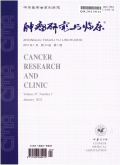放化疗转化治疗在不可切除局部晚期食管癌中的应用
Application of radiochemotherapy conversion therapy in unresectable locally advanced esophageal cancer
摘要目的:探讨放化疗转化治疗在不可切除局部晚期食管癌中的临床应用价值。方法:从美国监测、流行病学与最终结果(SEER)18肿瘤数据库中筛选2010-2016年接受放化疗或放化疗后手术治疗的不可切除局部晚期食管癌患者298例,根据放化疗后是否手术将患者分为转化治疗组(放化疗后手术)(83例)和放化疗组(215例)。采用R语言对两组患者行1∶1倾向性匹配分析.比较匹配前后两组患者年龄、性别、种族、T分期、G分期、病理类型、N分期等资料。采用Kaplan-Meier法进行生存分析,比较匹配前后两组肿瘤特异性生存与总生存(OS)。采用多因素Cox比例风险模型分析不可切除局部晚期食管癌患者预后的影响因素。结果:转化治疗组和放化疗组患者匹配前性别、种族、G分期、病理类型、T分期、N分期患者构成差异均有统计学意义(均 P<0.05),匹配后各临床病理特征差异均无统计学意义(均 P>0.05)。匹配前,转化治疗组患者的中位OS时间为23个月,1、2、3、5年OS率分别为68.9%、42.9%、24.7%、19.8%,1、2、3、5年肿瘤特异性生存率分别为68.9%、45.0%、28.0%、28.0%;放化疗组患者的中位OS时间为12个月,1、2、3、5年OS率分别为44.5%、20.5%、14.0%、6.0%,1、2、3、5年肿瘤特异性生存率分别为46.4%、21.8%、14.9%、9.1%;与放化疗组比较,转化治疗组患者肿瘤特异性生存( χ2=15.01, P=0.001)和OS( χ2=14.85, P<0.001)较好。匹配后转化治疗组的肿瘤特异性生存( χ2=5.06, P=0.024)和总生存( χ2=6.12, P=0.013)亦均优于放化疗组。多因素Cox回归分析结果显示,放化疗组的肿瘤特异性生存和总生存所受风险分别是转化治疗组的1.874倍(95% CI 1.275~2.755, P=0.001)、1.790倍(95% CI 1.235~2.593, P=0.002)。 结论:放化疗转化治疗能够改善不可切除局部晚期食管癌患者的预后。
更多相关知识
abstractsObjective:To investigate the clinical application value of radiochemotherapy conversion therapy in unresectable locally advanced esophageal cancer.Methods:A total of 298 patients with unresectable locally advanced esophageal cancer who received radiochemotherapy with or without surgery from 2010 to 2016 were screened in the U.S. Surveillance, Epidemiology, and End Results (SEER) 18 oncology database, and the patients were divided into the conversion therapy group (received surgery after radiotherapy, 83 cases) and the radiochemotherapy group (215 cases) according to whether they were operated after radiotherapy. A 1∶1 propensity matching analysis was conducted on the two groups of patients using R language. The information of age, gender, race, T stage, G stage, pathological type and N stage of the patients in the two groups before and after matching was compared. The Kaplan-Meier method was used for survival analysis to compare the cancer specific survival and overall survival (OS) between the two groups before and after matching. A multivariate Cox proportional hazards model was used to analyze the influencing factors of prognosis of patients with unresectable locally advanced esophageal cancer.Results:There were statistically significant differences in gender, race, G stage, pathological type, T stage, and N stage between the conversion therapy group and the radiochemotherapy group before matching (all P < 0.05). There was no statistically significant difference in clinicopathological characteristics between the conversion therapy group and the radiochemotherapy group after matching (all P > 0.05). Before matching, the median OS time of patients in the conversion therapy group was 23 months; the 1-year, 2-year, 3-year, and 5-year OS rates were 68.9%, 42.9%, 24.7%, and 19.8%, respectively; the 1-year, 2-year, 3-year, and 5-year cancer specific survival rates were 68.9%, 45.0%, 28.0%, and 28.0%, respectively. The median OS time of patients in the radiochemotherapy group was 12 months; the 1-year, 2-year, 3-year and 5-year OS rates were 44.5%, 20.5%, 14.0%, and 6.0%, respectively; the 1-year, 2-year, 3-year and 5-year cancer specific survival rates were 46.4%, 21.8%, 14.9%, and 9.1%, respectively. Compared with the radiochemotherapy group, patients in the conversion therapy group had a better cancer specific survival ( χ2 = 15.01, P = 0.001) and OS ( χ2 = 14.85, P < 0.001). After matching, cancer specific survival ( χ2 = 5.06, P = 0.024) and OS ( χ2 = 6.12, P = 0.013) of the conversion therapy group were still superior to the radiochemotherapy group. The results of multivariate Cox regression analysis showed that the cancer specific survival risk and overall survival risk in the radiochemotherapy group were 1.874 times (95% CI 1.275-2.755, P = 0.001) and 1.790 times (95% CI 1.235-2.593, P = 0.002) higher than those in the conversion therapy group. Conclusions:Radiochemotherapy conversion therapy can improve the prognosis of patients with unresectable locally advanced esophageal cancer.
More相关知识
- 浏览20
- 被引0
- 下载0


相似文献
- 中文期刊
- 外文期刊
- 学位论文
- 会议论文



 换一批
换一批 换一批
换一批



